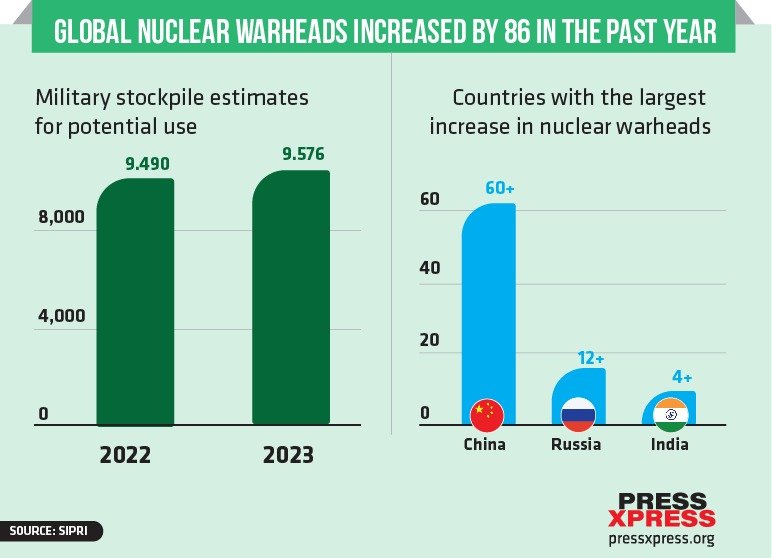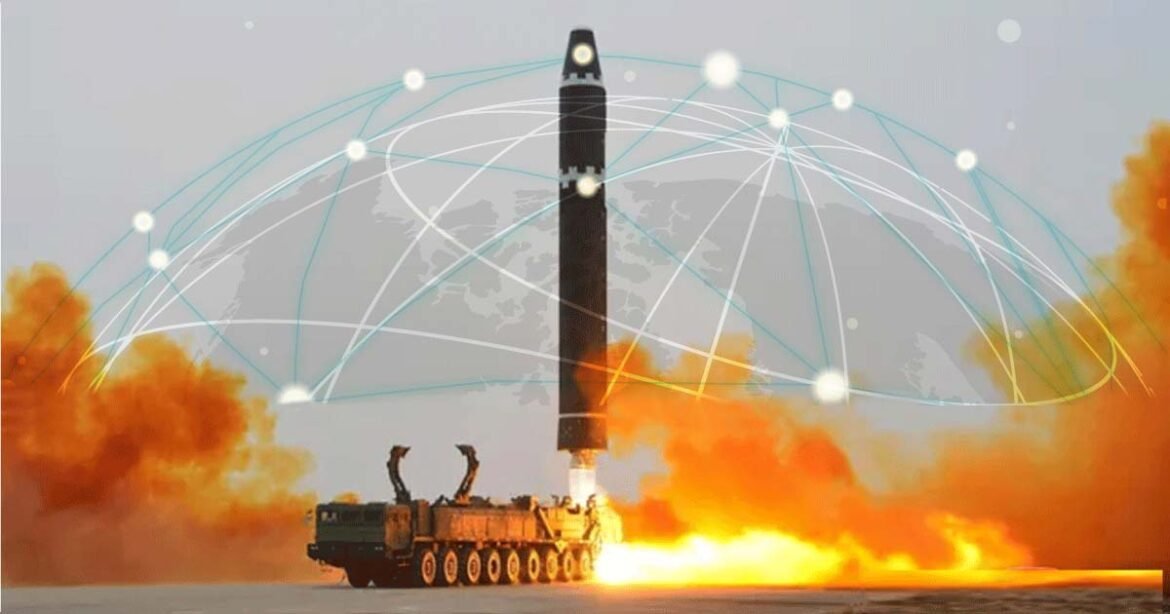The number of nuclear weapons held by major powers is on the rise, presenting a growing concern for the international community amidst escalating tensions and geopolitical rivalries. A recent report from the Stockholm International Peace Research Institute (SIPRI) have underscored the expansion and modernization of nuclear arsenals, giving rise to serious apprehensions regarding global security, the efficacy of disarmament efforts, and the potential resurgence of an arms race. Amidst the mounting global uncertainties, the steady increase in the number of nuclear weapons held by major powers demands immediate attention.
YOU CAN ALSO READ: DIGITAL SECURITY ACT: NECESSARY OR NEEDLESS?
This disconcerting trend not only poses a threat to global stability but also represents a setback in the decades-long pursuit of disarmament and non-proliferation. The international community must confront the realities of this situation and engage in meaningful discourse to address the implications and consequences of the rising nuclear stockpiles.
The thinktank’s assessment: A disturbing trend?
The latest report underscores the troubling rise in the number of nuclear weapons held by major powers. According to the report by the Stockholm International Peace Research Institute (SIPRI), the total number of nuclear warheads worldwide increased by approximately 2% from the previous year. As of the beginning of 2023, the nine nuclear-armed states collectively possessed an estimated total of around 13,080 nuclear warheads.

The report reveals that the United States and Russia, which together hold the majority of the world’s nuclear weapons, accounted for more than 90% of the global stockpiles. The United States possessed an estimated 3,800 nuclear warheads, while Russia had approximately 4,450. Both countries have been engaged in modernizing their nuclear arsenals, with plans to develop new delivery systems and upgrade existing ones.
The report by SIPRI also highlights the nuclear capabilities of other major powers. For instance, the United Kingdom possessed an estimated 225 nuclear warheads, France had around 200, China had approximately 350, and India and Pakistan each possessed around 165 and 165-170 warheads, respectively. Israel, which maintains a policy of ambiguity regarding its nuclear arsenal, is estimated to possess around 90-100 nuclear warheads.

These figures and trends underscore the concerning reality of an increasing global nuclear stockpile. Despite decades of diplomatic negotiations and treaties aimed at disarmament and non-proliferation, nuclear-armed states are actively investing in the expansion and modernization of their arsenals. This raises questions about the commitment of these states to their international obligations and the effectiveness of existing agreements in curbing the proliferation of nuclear weapons.
Furthermore, the report highlights the potential risks associated with this trend. The increase in nuclear stockpiles not only heightens the risks of accidental or unauthorized use but also contributes to the normalization of nuclear weapons as instruments of power and security. This, in turn, could fuel a new arms race and further undermine global stability and security.
SIPRI’s alarming revelations: A threat to global security?
Further supporting the concerns, the Stockholm International Peace Research Institute (SIPRI) conducted a comprehensive study, as reported by Reuters. The study confirms the unsettling increase in global nuclear stockpiles over the past year, indicating that nuclear-armed states are dedicating substantial resources to enhance their capabilities. The investments made by these states raise the spectre of a new arms race, exacerbating tensions and heightening the risks of nuclear proliferation. Such developments pose a significant threat to global security, as the potential for miscalculation and accidental escalation becomes more pronounced.
Strained relations and diminishing trust
Amid the ongoing conflict in Ukraine, nuclear diplomacy has suffered a severe blow. The crisis has strained relations between major powers, creating an atmosphere of mistrust and animosity. Priorities have shifted towards national security concerns and geopolitical rivalries, leaving little room for meaningful dialogue and cooperation on nuclear disarmament. The deteriorating relations among key players on the international stage hinder progress towards reducing nuclear threats and increasing the risks of misunderstandings and miscalculations with potentially catastrophic consequences.
The conflict in Ukraine has significantly strained relations between Russia and Western powers, particularly the United States and its NATO allies. The annexation of Crimea by Russia in 2014 and the ongoing conflict in Eastern Ukraine have fuelled tensions and deepened mistrust. This breakdown in relations has had a detrimental impact on nuclear diplomacy, as channels of communication and trust-building measures have been severely disrupted.
The deteriorating relations have prompted countries to prioritize their national security concerns and invest in bolstering their own defence capabilities, including their nuclear arsenals. The United States, for instance, has embarked on a major modernization program for its nuclear arsenal, allocating significant resources to replace aging systems and develop new capabilities. Russia, on the other hand, has been investing in the development of new intercontinental ballistic missiles and advanced nuclear weapons technologies.
The strained relations and diminishing trust among major powers have led to a reduction in meaningful dialogue and cooperation on nuclear disarmament. Communication channels that once facilitated confidence-building measures have become strained or severed altogether. This lack of open and constructive dialogue increases the risks of misinterpretation of intentions and raises concerns about potential accidental escalation.
Moreover, the breakdown in trust hampers efforts to resolve existing nuclear challenges and address emerging threats. Cooperation and coordination on non-proliferation initiatives, arms control agreements, and confidence-building measures become increasingly difficult to achieve in an environment characterized by suspicion and geopolitical tensions.
Geopolitical relations and nuclear arsenals: A troubling correlation
SIPRI’s yearbook also emphasizes the intricate link between geopolitical relations and investments in nuclear arsenals. The press release issued by SIPRI points out that as geopolitical relations deteriorate, countries tend to prioritize the expansion of their nuclear capabilities as a means of deterrence. This troubling correlation raises questions about the efficacy of diplomatic efforts and highlights the interconnectedness of geopolitical tensions and nuclear proliferation. As international relations become increasingly fraught with uncertainty, the temptation to rely on nuclear weapons as a tool of strategic advantage becomes more pronounced, further undermining disarmament efforts and global stability.
SIPRI’s findings indicate that during periods of heightened geopolitical tensions, countries tend to view nuclear weapons as a symbol of strength and a deterrent against potential adversaries. This perception drives the investment in nuclear arsenals, as states seek to bolster their capabilities to safeguard their national security interests. The press release points out that this correlation is particularly evident in regions marked by geopolitical rivalries, such as the Asia-Pacific and the Middle East.
The increasing focus on nuclear capabilities as a response to geopolitical tensions poses significant challenges to disarmament efforts. It creates a vicious cycle, where the expansion of nuclear arsenals by one country prompts its rivals to follow suit, heightening the risks of an arms race. As countries engage in a competition to maintain a strategic advantage, the global nuclear landscape becomes increasingly fragmented and volatile.
To wrap up, the steady increase in the number of nuclear weapons held by major powers, as highlighted by reputable sources, presents a clear and present danger to global security. It undermines the progress made in disarmament efforts, perpetuates geopolitical tensions, and heightens the risks of a renewed arms race and nuclear proliferation. In light of these developments, urgent action is required. The international community must prioritize dialogue, cooperation, and renewed diplomatic efforts to address the growing nuclear threat. Multilateral forums and mechanisms, such as the United Nations and existing nuclear disarmament treaties, need to be revitalized and strengthened. It is crucial for nations to reaffirm their commitment to nuclear non-proliferation, disarmament, and the pursuit of comprehensive security strategies that prioritize peace and stability over the destructive potential of nuclear weapons. Only through collective action and a renewed commitment to international norms can the world hope to mitigate the risks posed by the escalating nuclear arsenals and build a safer future for all.


